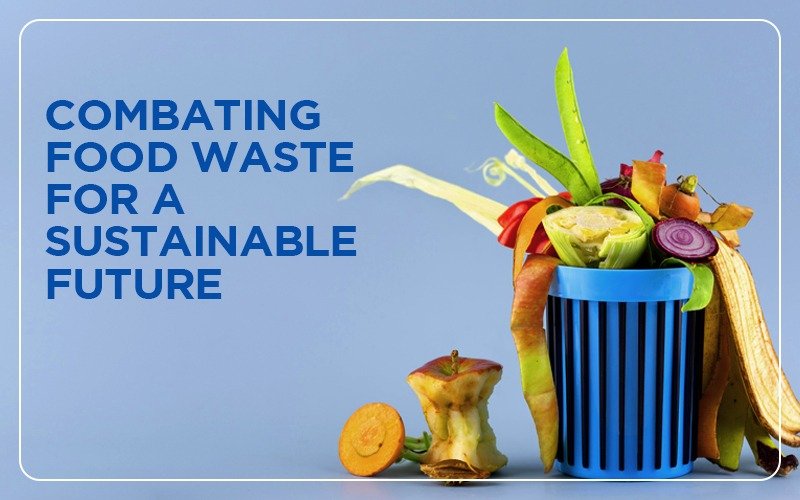
Combating Food Waste for a Sustainable Future
Posted on July 29, 2024
With the increasing population increases the food demand and thus consecutively increases the food waste as well. Around one third of the total food production is turning into food waste globally every year. This statistics is according to the UN Food and Agriculture Organization (FAO).
Hence, This Food waste is becoming a global issue that needs to be addressed. It’s high time We all play a role in combating food waste. Let’s move in the direction of creating a more sustainable food system.
Here’s why tackling food waste matters, and how you can become a champion for change:
From Field to Fork: Combating Food Waste for a Sustainable Future in India
In India, every year around 40% of the food gets lost or wasted along the food supply chain. This estimate almost equals 74 million tonnes of food. The food waste here directly represents the loss of nutrients.
There’s also wastage of resources, money and efforts spent during the production. Hence, Food loss and waste (FLW) hampers social, economical as well as environmental consequences. But there are still strategies to combat this FLW effectively in India.
Understanding Food Loss and Waste:
FLW has various stages from farm to fork. Let’s understand these faces:
On-farm losses:
The most common on farm loss reason is the lack of proper storage facilities which leads to spoilage. In addition, the traditional harvesting techniques and inadequate irrigation systems also contribute.
Post-harvest losses:
After harvest, comes the logistical challenge. The poor transportation and processing leads to further spoilage. The lack of cold storage facilities and inefficient supply chains are active contributors.
Retail and consumer waste:
After the food reaches the final stage, it encounters retail and consumer waste. The unrealistic cosmetic standards for fruits and vegetables that lead to rejection, and uneaten leftovers all contribute to the problem. There’s also a lack of proper storage awareness.
The Ripple Effect of Food Waste:
The impact of FLW is a combination of economic, social and environmental effects. From the economic facet, there’s evident loss in the income for farmers and businessmen. Collectively, the loss for the nation.
Spoilage and discarding unsold food plays a major role in the nation’s poverty alleviation due to wastage of resources. Socially, FLW contributes to food insecurity. There’s eventually a lack of access to sufficient and nutritious food.
In environmental impact, Wasted food decomposes in landfills. Due to this decomposition greenhouse gasses are released. Thus, the climate changes and the resources used to produce wasted food are essentially wasted as well.
The Circular Economy: A Framework for Change
One of the solutions to combat this FLW is circular economy. It basically focuses on reducing waste and maximizing resource use. Here’s how it applies:
Prevention:
Prevention is always better than cure. Thus, it is important to improve agricultural practices and invest in proper storage facilities. This will reduce farm losses and spoilage.
Reuse:
For some extra income for farmers and small businesses, rejected food can be used. Such fruits and vegetables can be used for processing into jams and pickles or sold at discounted rates in local markets.
Recycling:
Recycle Food scraps and leftover food to create nutrient-rich fertilizer for farms. Promote community composting initiatives and educate households on composting techniques.
Redistribution:
Extra food from restaurants or weddings can be redirected to food banks and community kitchens. There are Organizations like Akshaya Patra and Robin Hood Army that are already working in this direction.
Building Sustainable Food Systems in India
Creating a sustainable food system that minimizes FLW is a collaborative effort. Lets see how:
Government:
- Invest in infrastructure like cold storage facilities and improved transportation networks.
- They can promote awareness campaigns about food waste reduction.
- Policies are required to incentivize responsible food production and consumption.
Businesses:
- Supermarkets need to explore partnerships with food banks to donate nearing-expiry items.
- They can promote responsible consumption practices through customer education campaigns.
- Food processing companies can develop innovative packaging solutions to extend shelf life.
- Restaurants can implement portion control measures.
Consumers:
- Plan meals to avoid unnecessary purchases, and buy only what you need.
- Store food properly using traditional techniques like storing grains in airtight containers or using cloth bags for vegetables.
- Utilize the “ugly” food produce.
Success Stories and the Way Forward
Farmer Producer Organizations (FPOs):
These are community-based organizations. They help small and marginal farmers helping with on farm and logistical losses.
Government Initiatives:
There are schemes like the Pradhan Mantri Garib Kalyan Anna Yojana (PMGKY). They provide subsidized food grains to millions. In addition, initiatives promoting organic farming and sustainable agricultural practices should be there.
Conclusion:
Combating FLW isn’t just about saving food; it’s about creating a more sustainable future for India and its people. It needs to ensure that food reaches those who need it most. The environmental impact also needs to be minimized.
Together, we can make a significant difference in tackling food waste. Thus, building a more sustainable food system. Remember, even small changes in our daily habits can collectively create a large-scale impact.
Let’s start today and make “Save Food, Save the Future” our collective motto!
